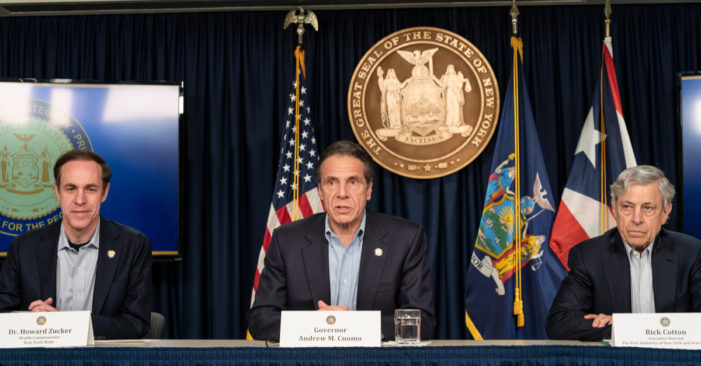New York, NY – February 2, 2020: Governor Andrew Cuomo with Dr. Howard Zucker & Rick Cotton updated the press on status of testing for novel coronavirus in New York State at 633 Third Avenue (Shutterstock)
By THE CITY
Gov. Andrew Cuomo has a message for New York City: Get tougher on screening patients for the state’s budget-busting Medicaid program or expect to shoulder more of the cost.
Mayor Bill de Blasio projects the governor’s proposal could run the city an extra $1.1 billion a year, on top of more than $5 billion it already devotes to Medicaid.
Yet guarding the gate of the fastest-growing part of New York’s Medicaid program is Maximus — a private, Virginia-based firm with a $1 billion state deal shrouded in such secrecy that even state Comptroller Thomas DiNapoli was barred by law from reviewing costly contract additions.
As Cuomo seeks to cut $2.5 billion this year with the help of a Medicaid Redesign Team, some state lawmakers have started asking questions about Maximus, which decides who gets pricey long-term care.
“We should absolutely make sure that the [state] Department of Health is not overpaying on any contracts before they’re cutting any [Medicaid] services,” State Sen. Alessandra Biaggi (D-The Bronx) told THE CITY.
Nearly $4B in Contracts
Maximus evaluates every patient in New York State who seeks coverage under Managed Long Term Care, which provides home health aides and other services to people who have difficulty caring for themselves over an extended period of time.
The company dispatches registered nurses to applicants’ homes — more than 7,500 times a month, according to the state Department of Health — and administers a scored questionnaire. Can the person bathe and dress themselves? Navigate stairs? Remember what someone just said?
The Health Department says 95% of applicants pass the screening, which involves no medical testing. Three out of four of the requests for evaluations come from New York City, state records show.
New York alone accounts for one-third of the company’s business in the United States, according to a recent filing with the Securities and Exchange Commission — a line of work that yielded $58 million net profit for Maximus in just the last three months of 2019.
Maximus also operates New York’s Obamacare enrollment center under a separate contract, employing more than 2,100 customer service reps, according to state records. In all, the firm has $3.7 billion in New York State contracts.
Biaggi, a member of the Senate’s Health Committee, pressed state Medicaid Director Donna Frescatore on New York’s dealings with Maximus at a budget hearing in Albany late last month.
“How are you ensuring that they are not abusing their contract with New York State and that their profits are actually reasonable, considering how much we’re paying them in a year where we have a $6 billion [state budget] deficit?” Biaggi asked.
Frescatore responded that the terms of Maximus’ contract are “fair and responsible, and to the interests of not only consumers but the taxpayer.”
Expenditures and invoices are “reviewed carefully” every month, said Jeffrey Hammond, a state Department of Health spokesperson.
A spokesperson for Maximus, an international outfit that’s reaped billions since 1975 by administering safety-net programs, did not immediately respond to requests for comment.
Surging Enrollment
More than 6 million New Yorkers are enrolled in Medicaid, the state and federal insurance program for the poor. About 5% of them are enrolled in Managed Long Term Care, which delivers home care attendants to the elderly and chronically ill by contracting with private insurance plans.
Yet as THE CITY has reported, that 5% accounts for roughly one-third of the state’s $26 billion in annual Medicaid spending, according to the state Division of Budget.
Starting in 2012, at the recommendation of Cuomo’s original Medicaid Redesign Team, the state began to require patients who receive home care and similar services to shift into Managed Long Term Care.
The Department of Health estimated that about 80,000 people would enroll. Since then, signups have skyrocketed — along with costs.
Last year, 216,000 people were enrolled in Managed Long Term Care, according to state data provided to THE CITY. State budget director Robert Mujica said last month that annual state spending on the long-term care program has surged by $4.8 billion since 2013.
City and county governments step in solely to determine who’s poor enough to qualify under state rules. For Managed Long Term Care, officials review just 30 days of an applicant’s financial records to determine eligibility.
“Our role is to make sure that people who meet the financial standards receive Medicaid and then the state vendor makes the determination whether someone gets long term Medicaid managed care,” New York City Social Services Commissioner Steve Banks said during a recent visit to Albany.
Invisible Finances
Managed care companies at first approved patients themselves, prompting concerns over sometimes aggressive recruitment practices. But since late 2014, the state has paid Maximus to decide who’s sick or disabled enough to qualify for long term in-home care, via its Conflict-Free Evaluation and Enrollment Center.
The Department of Health tacked this responsibility onto a 2011 Maximus contract to handle Managed Long Term Care enrollment. Originally, the competitively bid deal lasted four years and amounted to $140 million.
While adding the evaluation screenings, the state and Maximus have stretched that four-year agreement to 11 years — and $1.15 billion. Of that, the state has so far paid Maximus $546 million, state records show.
Maximus submitted a report to the state comptroller showing the firm employed about 227 nurses and medical assistants in the year ending last March, billing the state $40 million for their services.
Beyond that, what Maximus is doing with taxpayers’ money remains largely invisible to the outside world.
The Cuomo administration inserted language in previous state budgets that exempted changes to Maximus’ contract from the state comptroller’s review — allowing the state health officials to extend the deal “without a competitive bid or request for proposal process” if they found that the company is “qualified.”
As a result, neither DiNapoli nor state lawmakers actually saw the changes to the contract before it was executed, thwarting oversight.
While DiNapoli’s office couldn’t review the changes, his team could do a post-audit of the contracts and payments made under it, a spokesperson said.
Hammond, the state Health Department spokesperson, said the language exempting the changes from being reviewed was added “to promote savings to the state, efficiency in service delivery and continuity of service to consumers.”
“Under the terms of the contract amendment, monthly vouchers submitted by MAXIMUS undergo a rigorous expense verification process to ensure that quantities and amounts charged are appropriate and consistent,” Hammond said in an email.
Over the last year, the state comptroller’s office has conducted its own “independent review” of the vouchers reviewed by the Department of Health, Hammond added.
Among concerns raised by Biaggi was an 18.6% profit margin SEC filings show on the company’s business with various states — far higher than on its federal government and international work.
’An 800-Pound Gorilla’
State Assemblymember Richard Gottfried (D-Manhattan), who chairs his chamber’s health committee, said the arrangement raises serious concerns about the state’s ability to manage Maximus.
The Cuomo administration’s “insistence on waiving the usual procurement rules shows what happens when a contractor becomes an 800-pound gorilla,” he said. “There’s just no way to hold any private company accountable when the state would stop functioning without it.”
When DiNapoli has reviewed other Maximus contracts with the state, he found no performance issues but did question some spending.
A 2014 comptroller audit found Maximus employees billed for $599-a-night hotel rooms — an expense deemed “extravagant” and in excess of federal and state government limits. DiNapoli’s office also questioned a 17.65% profit charged on labor and other costs. The DOH says it subsequently lowered the rate to 15%.
A DiNapoli review two years later found the state Health Department’s oversight of the Maximus Obamacare exchange adequate.
Said DiNapoli in a statement: “The Comptroller’s Office provides important oversight of the contracting process, helping to ensure transparency, fairness and value for taxpayers. An independent review ensures better outcomes for New Yorkers.”
Gottfried said the Maximus’ deals with the state demand more oversight.
“A $3 billion contractor might as well be a state agency, except that a state agency is ultimately responsible to the democratically elected governor who appoints its leader, while a private contractor is ultimately responsible to its shareholders,” he said.
This story was originally published on [February 24, 2020] by THE CITY.”

